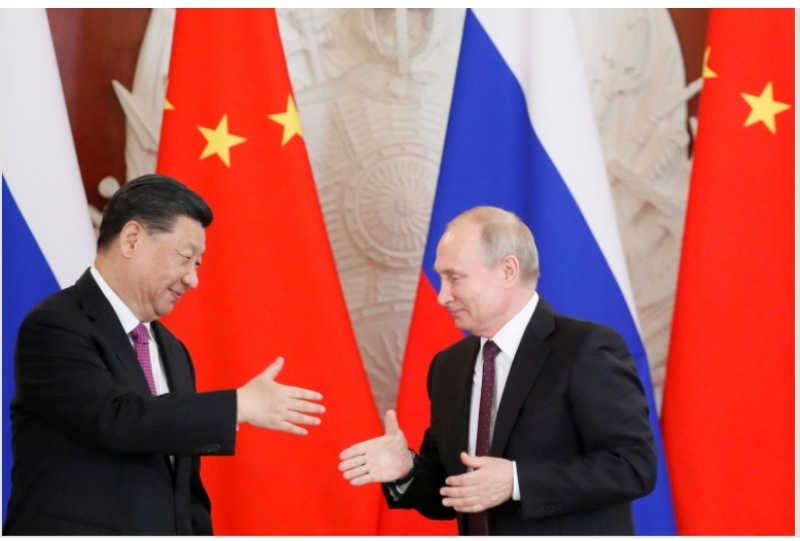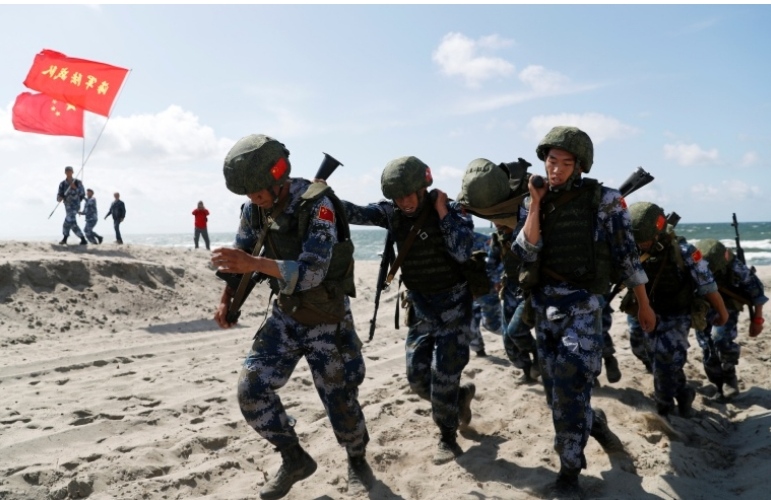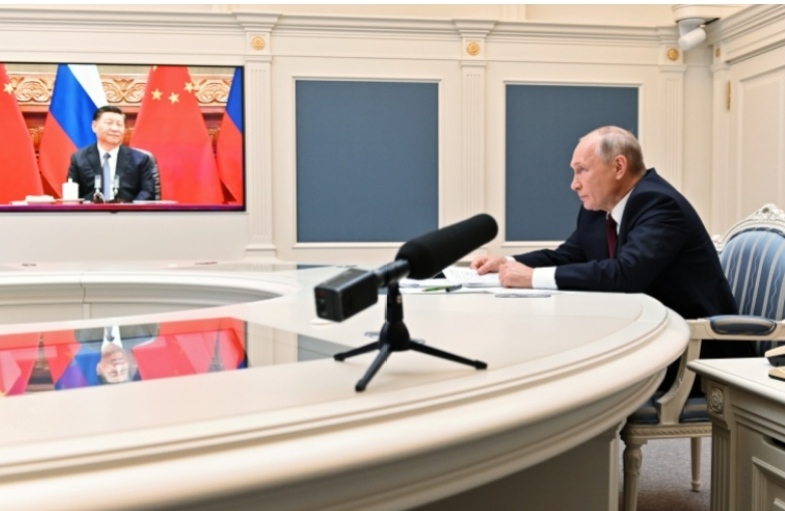Why are China and Russia Strengthening Ties?
By
Zaheena Rasheed

Russian President Vladimir Putin attempts to shake hands with his Chinese counterpart Xi Jinping
Weeks after sailing warships around Japan’s main island, the Chinese and Russian militaries have sent bomber flights into Japanese and South Korean air defence zones, forcing Seoul to scramble its fighter jets in response.
In Tokyo on Tuesday, Japan’s Defence Minister Kishi Nobuo met reporters to express “grave concern” over the joint patrols, which took place last week, saying Beijing and Moscow’s moves clearly indicate that the “security situation surrounding Japan is growing more severe”.
As he spoke, his Chinese and Russian counterparts were holding virtual talks, where they lauded the air and naval drills as “major events” and inked a new pact to further deepen defence ties.
The roadmap, signed by Russia’s Defence Minister Sergei Shoigu and his Chinese vis-à-vis Wei Fenghe, capped a year that has seen an unprecedented growth in military cooperation, including large-scale war games in China’s Ningxia in August, when Russian troops became the first foreign forces to join a regular Chinese drill, as well as announcements to jointly develop military helicopters, missile attack warning systems and even a research station on the moon.
“It’s the strongest, closest and best relationship that the two countries have had since at least the mid-1950s. And possibly ever,” said Nigel Gould-Davies, Senior Fellow for Russia and Eurasia at the International Institute for Strategic Studies (IISS).

Marines from China take part in the International Army Games 2019 at the Khmelevka firing ground on the Baltic Sea coast in Kaliningrad Region, Russia
Noting that China-Russia relations have historically been marked by mutual wariness, including a border conflict in the 1960s that reportedly pushed Beijing and Moscow to the brink of nuclear war, Gould-Davies said the current state of affairs is “exceptional”. Ties have “developed very rapidly, really within the past 10 years,” he said, accelerating in the wake of Western sanctions on Russia over its annexation of Crimea in 2014.
It is not only on defence that the two have moved closer but also on the diplomatic and economic fronts.
On foreign policy, Beijing and Moscow share similar approaches to Iran, Syria and Venezuela, and recently revived a push to lift United Nations sanctions on North Korea.
China’s President Xi Jinping and Russia’s Vladimir Putin have a personal rapport, too, having met more than 30 times since 2013. The Chinese leader has even called Putin his “best friend”.

Russian President Vladimir Putin takes part in a video conference call with Chinese President Xi Jinping at the Kremlin in Moscow, Russia
For China, Russia is the biggest supplier of its weapons and the second-largest source of its oil imports. And for Russia, China is its top country trading partner and a key source of investment in its energy projects, including the Yamal LNG plant in the Arctic Circle and the Power of Siberia pipeline, a $55bn gas project that is the largest in Russian history.
Gould-Davies of the IISS said the main driver behind all of this is China and Russia’s hostility towards liberal democratic values.
“Both countries are ruled by anti-democratic regimes that share a strong common interest in resisting the influence of liberal Western values within their own countries,” he told Al Jazeera. “They also have a strong shared interest in undermining the states and alliances, beyond their own borders, that embody liberal values. So, their main common interest is in effect, an ideological one – they seek to undermine the democratic and liberal West.”
Self-fulfilling prophecy?
The deepening of ties has indeed worried the West, with American intelligence assessments listing China, Russia and their alignment as the biggest security threats to the United States and NATO, the Western security alliance created in 1949 as a bulwark against the Soviet Union, planning to broaden its focus to address countering both countries.
In an interview with the London-based Financial Times last month, NATO Secretary-General Jens Stoltenberg said he does not see China and Russia as two separate threats.
“China and Russia work closely together,” he said. “This whole idea of distinguishing so much between China, Russia, either the Asia-Pacific or Europe — it is one big security environment and we have to address it all together.”
But some say this assessment is too simplistic and could result in “grave mistakes”.
“There is no grand conspiracy against the West,” said Bobo Lo, a former Australian diplomat and an independent international relations analyst last month. “What this is, is a classic great power relationship, meaning it’s driven by common interests, rather than shared values,” he said at a virtual talk organised by the US-based Center for Global Security Research.
By supporting each other, China and Russia gain “critical dividends”, Lo said, including reinforcing the “legitimacy and stability of their respective regimes”. Defence cooperation allows Moscow to project Russian influence on the world stage, he added, while Beijing is able to gain access to Russia’s advanced military technology and operational experience.
The relationship also allows Moscow to “fill the technological gap left by the withdrawal of Western companies in Russia” following sanctions imposed in the aftermath of the annexation of Crimea. “And Chinese investment in technology has been absolutely critical to the realization of Russia’s Arctic LNG projects,” Lo said.
Alexander Gabuev at the Carnegie Moscow Center agrees.
Ties between Russia and China are “driven by fundamental factors beyond Western control”, he said, noting in a talk in March that the two countries also share a 4,300 kilometre (2,672 mile) border. Due to the border clashes of 1969, “they know how really dangerous and expensive it is to be enemies,” he said.
That is why, he said on Twitter last month, NATO’s claim that China and Russia are one challenge, “overstates current level of China-Russia cooperation and nuances”.
Both countries are “religious about their strategic autonomy,” he said. And “by lumping China and Russia together as a quasi-alliance that needs to be countered through a unified toolkit, the West risks creating a self-fulfilling prophecy, when dual containment leads to further deepening of China-Russia cooperation, that leads to more US pressure.”
‘Hypocritical aggressor’
For some, US pressure is the starting point.
“Both China and Russia feel the US is a hypocritical aggressor who is intent on diminishing them in order to maintain hegemony,” said Einar Tangen, a Beijing-based political analyst who also works as a commentator for China’s state broadcaster CGTN.
US actions in this regard, he said, include branding the two countries as its biggest national security threats, the imposition of sanctions over alleged human rights abuses, as well as the forging of what Beijing and Moscow view as anti-Russia-China alliances.
These include the Quad, an informal US-led alliance that includes India, Japan and Australia. The group, which China has denounced as an “Asian NATO”, resumed naval drills last year for the first time in 13 years. The four navies expanded the exercises this year by holding them in two phases in the Philippine Sea and in the Bay of Bengal.
Then there is the newly formed security alliance between Australia, the United Kingdom and the US, known as the AUKUS. Announcing the trilateral pact in September, the US and UK said Australia will get nuclear-powered submarines – a move analysts said would allow the Australian navy to patrol the disputed waters of the South China Sea as well as the Taiwan Strait.
China condemned the alliance as an “extremely irresponsible” threat to regional stability, while Russia called it a “great challenge to the international nuclear non-proliferation regime”.
“These [type of actions] inevitably encourage China to conduct closer cooperation with Russia to seek reciprocal responses to hostile acts,” said Danil Bochkov, an analyst at the Moscow-based Russian International Affairs Council.
These responses include the recent joint Chinese-Russian drills in the vicinity of Japan and South Korea, both of whom are US allies.
Bochkov said the intensifying rivalry may well result in the re-emergence of the rigid blocs seen during the Cold War, with the US-led community on one side and China, Russia and their allies on the other.
“That creates geopolitical stalemate which seems impossible to overcome whatsoever,” he said, “leaving all powers to accumulate their might for worst-case scenario by simultaneously testing each other’s ‘red lines’ with dangerous pinprick-like local face-offs.”
Source: Al Jazeera




